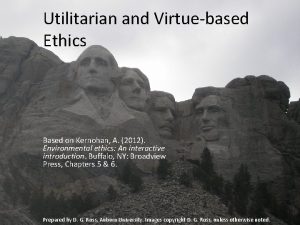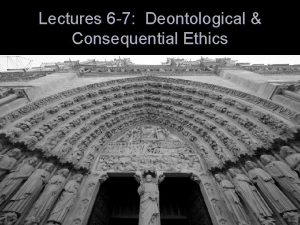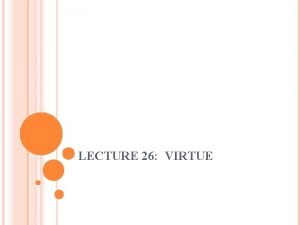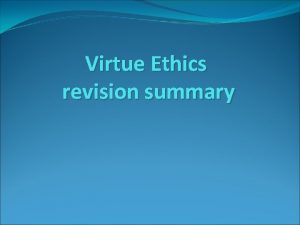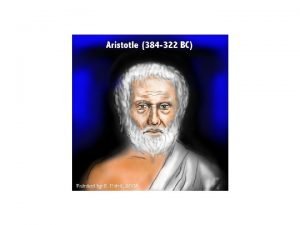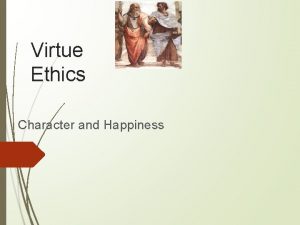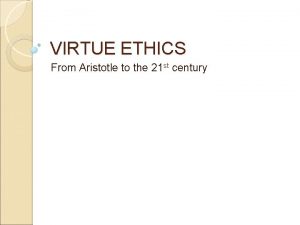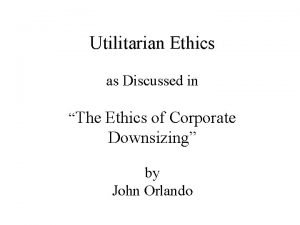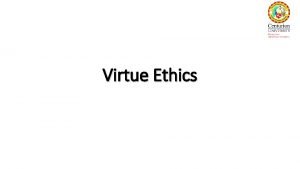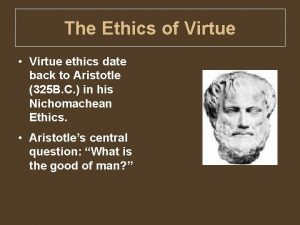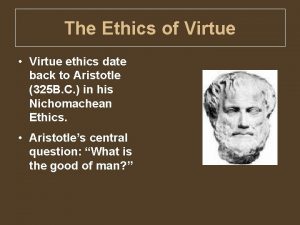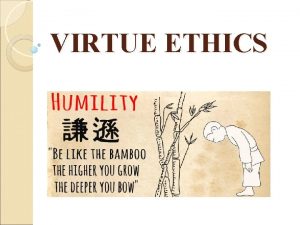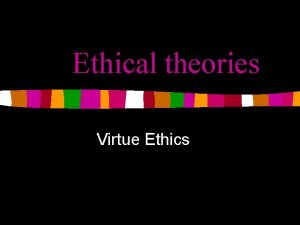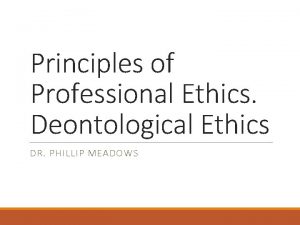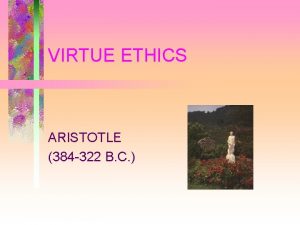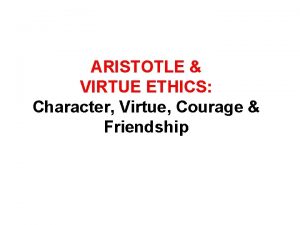Principles of Professional Ethics Virtue Ethics DR PHILLIP


















- Slides: 18

Principles of Professional Ethics Virtue Ethics DR. PHILLIP MEADOWS

Virtue Ethics Consequentialism and deontology are ethical theories that take actions to be the subject matter for ethical theory. ‘x is morally good/bad’. x should always properly be replaced by a word for an action. Virtue ethics is approach to ethical theory which takes the character of agents to be the focus of moral value. ◦ It aims to describe the character one should develop or the person one should be. Has a long pedigree: ◦ ◦ Buddhism; Classical Greek Philosophy; Medieval Islamic and Christian Philosophy; Modern Moral Philosophy.

Virtue Ethics "The thought manifests as the word. The word manifests as the deed. The deed develops into habit. And the habit hardens into character. So watch the thought and its ways with care. And let it spring from love, born out of concern for all beings. ” (Buddha Siddhartha) Virtues are “states of mind in which the human being carries out good and kind deeds. [. . . ] They can be either ethical or rational; the latter are virtues of the rational element in the intelligent human being, such as wisdom, common sense, inventiveness and cleverness. The ethical virtues are, among others, temperance, courage, generosity and justice’’ (Al Farabi, Kitab al-milla)

Virtue Ethics “When Jane and Elizabeth were alone, the former, who had been cautious in her praise of Mr. Bingley before, expressed to her sister how very much she admired him. ‘He is just what a young man ought to be, ’ said she, ‘sensible, good-humoured, lively; and I never saw such happy manners! So much ease, with such perfect good breeding!’ ‘He is also handsome, ’ replied Elizabeth, ‘which a young man ought likewise to be if he possibly can. His character is thereby complete. ’" (Jane Austen, Pride and Prejudice, ch. 4) Notice the list of character traits: ◦ Sensible. ◦ Good-humoured. ◦ Lively.

The Highest Good One of the most celebrated and detailed accounts comes from Aristotle in his Nicomachean Ethics. Aristotle asks: what is the ‘highest good' for humans? ◦ This is expressed in terms of the 'end' or 'purpose. ' "Every art and every enquiry, and similarly every action and choice, is thought to aim at some good; and for this reason the good has rightly been declared to be that at which all things aim. " (Aristotle, Nichomachean Ethics i. 3) Musical arts aim at the creation of music. The builder’s ‘art’ aims at the creation of houses. What is the ultimate aim of all human activity? What is the highest good for humans?

The Highest Good The highest good is something that will be: 1. desirable for its own sake, 2. not desirable for the sake of some other good and 3. such that all other goods are desirable for its sake. E. g. : 1. 2. Money – fails 1: not desirable for its own sake. Education – fails 2: desirable for its own sake, but is also desirable for other things it can get you. 3. Love – desirable for its own sake and not because of what other goods it gets you. ◦ BUT love fails the third condition – money, for instance, is not desirable because it can get you love. Money can’t buy you love.

The Highest Good: Eudaimonia Aristotle says Eudaimonia (translated as 'happiness’, or ‘flourishing’) is the highest good. But we need an account with more details. Aristotle derives this from the function of humans: 1. 2. 3. 4. 5. If something has a function, it’s good depends on that function. So, the human good depends on the human function. The human function must involve the exercise of a distinctive power or faculty, i. e. one not shared by plants and animals: that is reason. If something has a function, its good is (a) to perform that function (not just to have the capacity to do so); and (b) to perform the function well, or with excellence (arête, virtue). So, The human good is excellent activity of the part of the soul that has reason. i. e. it is “activity of the soul in accord with virtue…”

Virtue So, virtues are part of a flourishing, Eudaimonic life. But, what is a virtue? "Virtue is a state connected with choice, lying in a mean relative to us, a mean being determined by reason, and in the way in which the man of practical wisdom would determine it" (Aristotle, Nichomachean Ethics, ii. 6) What is meant by: ◦ 'state' ◦ 'lying in a mean relative to us' ◦ 'determined by reason'?

Virtue is a state (hexis) of a person: ◦ not a feeling (sensations, emotions, etc. ), ◦ nor a disposition or a tendency, which may not be manifested; ◦ but a habit to both act and have feelings. 1. Someone who is occasionally moved to charitable acts by strong feelings, does not have a habit of being charitable. 2. The misanthrope who acts from a sense of duty lacks the habit to have the relevant feelings. Habits are built up over time through the right moral education.

Virtue is a state lying in a mean relative to us. ◦ “Now virtue is concerned with passions and actions, in which excess is a form of failure, and so is defect, while the intermediate is praised and is a form of success…. Therefore virtue is a kind of mean, since, as we have seen, it aims at what is intermediate. ”(Aristotle, Nichomachean Ethics ii. 6) ◦ The mean is the appropriate response in a particular case. The mean is not simply moderation. ◦ The idea is that the right response neither goes too far not far enough. E. g. courage is ◦ to have a disposition to feel just a certain amount of fear in a challenging situation, but ◦ not so much fear that you shirk from the appropriate action. “For instance, both fear and confidence and appetite and anger and pity and in general pleasure and pain may be felt both too much and too little, and in both cases not well; but to feel them at the right times, with reference to the right objects, toward the right people, with the right motive, and in the right way, is what is both intermediate and best, and this is a characteristic of virtue. ” (Aristotle, Nichomachean Ethics ii. 6)

Virtue is a state lying in a mean relative to us, being determined by reason. Eudaimonia means acting in accordance with the distinctive human function – the exercise of rationality. ◦ E. g. , someone who is easily persuaded by the news, peer pressure, etc. ◦ Here the person may still feel the right emotions, but their disposition to act is not guided by their reason. Aristotle would say in this case that the person has virtuous dispositions but falls short of a virtuous state.

Problems: Bad Luck If a good character requires good habits, and good habits require good education and training, doesn’t this make moral life subject too much to luck? ◦ How can we blame someone for a bad character, if they had bad teachers and role models? ◦ How can we praise someone for a good character, if they had good teachers and role models? When we think about moral responsibility, we often think that you can only be responsible for the things you cause, or could have prevented. But if our character is something formed by things beyond our control, we cannot be responsible for our character. So, we can’t be responsible for whether we are a good or a bad person.

Problems: Action Guiding Objection Consequentialism and deontology can offer detailed ways of deciding what the right action is on any given occasion, even moral dilemmas. By contrast, Aristotle does not offer any detailed way of determining what is the morally right action on any occasion. ◦ The worry is that at best we get vague, bland claims. Consider the following phrases from Aristotle: ◦ "Virtue is a state connected with choice, lying in a mean relative to us, a mean being determined by reason, and in the way in which the man of practical wisdom would determine it" (Book 2, Ch. 6) ◦ ”…but to feel them at the right times, with reference to the right objects, toward the right people, with the right motive, and in the right way, is what is both intermediate and best, and this is a characteristic of virtue. ” (Loc. Cit. ) How will virtue ethics help us address the trolley problem, or the patient problem?

Problems: Which Virtues? If there is no clear explanation of why a state of character is virtuous, then how do we decide between incompatible sets of virtues? Consider tolerance. ◦ Tolerance might mean different things to different people. ◦ Is tolerance: ◦ Allowing people to behave in a way you disapprove of publicly? ◦ Allowing people to behave in a way you disapprove of privately? ◦ Is tolerance even a virtue? Some view it as a vice. Can virtue ethics provide an answer to this question? If it did, wouldn’t it end up resembling utilitarianism or deontology?

Problems: Circular Reasoning? How is the mean determined? Moral virtue is determined by the mean. The mean is determined by the principle that would be used by a person of practical wisdom. What makes someone practically wise? What makes an end morally virtuous? A person of practical wisdom is someone who deliberates well from morally virtuous goals or ends. Circular accounts are to be avoided when the circle is this small!

Virtues and Professions: American Medical Association Code of Ethics 1. A physician shall be dedicated to providing competent medical care, with compassion and respect for human dignity and rights. 2. A physician shall uphold the standards of professionalism, be honest in all professional interactions, and strive to report physicians deficient in character or competence, or engaging in fraud or deception, to appropriate entities. 3. A physician shall respect the law and also recognize a responsibility to seek changes in those requirements which are contrary to the best interests of the patient. 4. A physician shall respect the rights of patients, colleagues, and other health professionals, and shall safeguard patient confidences and privacy within the constraints of the law. 5. A physician shall continue to study, apply, and advance scientific knowledge, maintain a commitment to medical education, make relevant information available to patients, colleagues, and the public, obtain consultation, and use the talents of other health professionals when indicated. 6. A physician shall, in the provision of appropriate patient care, except in emergencies, be free to choose whom to serve, with whom to associate, and the environment in which to provide medical care. 7. A physician shall recognize a responsibility to participate in activities contributing to the improvement of the community and the betterment of public health.

New York Lawyer’s Code of Professional Responsibility EC 1 -1 A basic tenet of the professional responsibility of lawyers is that every person in our society should have ready access to the independent professional services of a lawyer of integrity and competence. Maintaining the integrity and improving the competence of the bar to meet the highest standards is the ethical responsibility of every lawyer. EC 1 -2 The public should be protected from those who are not qualified to be lawyers by reason of a deficiency in education or moral standards or of other relevant factors but who nevertheless seek to practice law…. EC 1 -3 Before recommending an applicant for admission, a lawyer should be satisfied that the applicant is of good moral character…. EC 1 -4 The integrity of the profession can be maintained only if conduct of lawyers in violation of the Disciplinary Rules is brought to the attention of the proper officials. A lawyer should reveal voluntarily to those officials all knowledge, other than knowledge protected as a confidence or secret, of conduct of another lawyer which the lawyer believes clearly to be a violation of the Disciplinary Rules that raises a substantial question as to the other lawyer's honesty, trustworthiness or fitness in other respects as a lawyer. … EC 1 -5 A lawyer should maintain high standards of professional conduct and should encourage other lawyers to do likewise. A lawyer should be temperate and dignified, and should refrain from all illegal and morally reprehensible conduct. Because of the lawyer's position in society, even minor violations of law by a lawyer may tend to lessen public confidence in the legal profession…. EC 1 -7 A lawyer should avoid bias and condescension toward, and treat with dignity and respect, all parties, witnesses, lawyers, court employees, and other persons involved in the legal process.

Questions 1. What is the focus of Virtue Ethics? How does this differ from consequentialism and deontology? 2. Explain in your own words why money, education, and wealth cannot be considered the highest good for mankind. Think of three more examples of goods that cannot be the highest good. Explain why not. 3. Do you agree with Aristotle’s claim that virtue is action in accordance with reason? If so, why? If not, why not? 4. Do you agree with Aristotle that the misanthrope who still gives to charity and performs good actions lacks a good character? 5. Is it courageous to face unbeatable odds in a battle? 6. Which do you think is the most difficult objection to virtue ethics? How do you think Aristotle would reply?
 Virtue ethics theory definition
Virtue ethics theory definition Real life examples of virtue ethics
Real life examples of virtue ethics Virtue theory
Virtue theory Ulitiarism
Ulitiarism What is virtue ethics
What is virtue ethics Deontological moral theory
Deontological moral theory Enkratic
Enkratic Virtue vs value
Virtue vs value Utilitarianism vs virtue ethics
Utilitarianism vs virtue ethics Virtue ethics
Virtue ethics Virtue ethics vs utilitarianism
Virtue ethics vs utilitarianism Virtue ethics revision
Virtue ethics revision Ethical theories
Ethical theories Virtue vs ethics
Virtue vs ethics Aristotle virtue ethics
Aristotle virtue ethics Virtue ethics in nursing
Virtue ethics in nursing Virtue thics
Virtue thics Aristotles virtues
Aristotles virtues Virtue ethics example
Virtue ethics example



